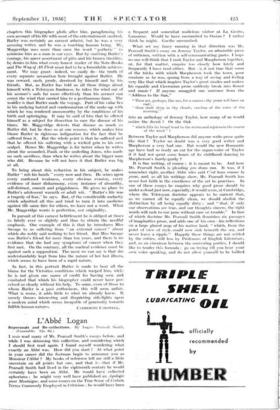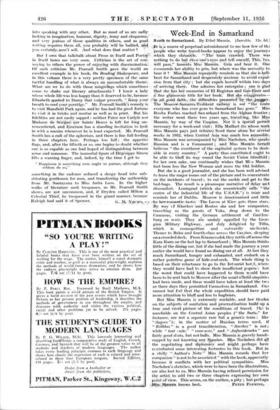L'Abb6 . Logan
I HAD read many of Mr. Pearsall Smith's essays before, and while I was -skimming this collection, and considering- which I should first read again, I found myself wondering what exactly an Abbe was. How did you start ? At what- point in your career did the footman begin to announce you as Monsieur l'Abbe ? My books of reference left me still a little uncertain on all points but one, and' that isâthat if Mr. Pearsall .Smith had lived in the eighteenth century he would certainly have been an Abbe. He would have collected aphorisms : he might very well have published; an Apologie pour Montaigne, and- some essays on the True- Sense of :Certain Terms-Commonly Employed in Criticism :-he would have been
a frequent and somewhat malicious visitor at La Grottc, Lausanne. Would he haVe succumbed to Ossian ? I rather think he might. Goethe succumbed.
⢠What . set my fancy running in that direction was Mr. Pearsall Smith's essay on Jeremy Taylor, an admirable piece
of criticism, written' with a self-communicating -gusto. I hope no one will think that I rank Taylor and Macpherson together;
or, for that matter, enquire too closely how lately and frequently I have read either. Butâis it not true that some of the tricks with which Macpherson took the town, poor creature as he was, sprang from a way of seeing and feeling very like that which inspires Taylor's great similes and makes- his equable and .Ciceronian prose suddenly break into flower and music ? If anyone smuggled one sentence from the "Address to the Sun,"
Thou art, perhaps, like me, for a season: thy years will have an end:
. " thou shalt sleep in thy clouds, careless of the voice of the morning."
into an anthology of Jeremy Taylor, how many of us would notice the deceit ? Or the Oak
" which lifts its broad head to the storm and rejoices in the course of the wind "
Between Taylor and Macpherson did anyone write prose quite like that ? Taylor no doubt was a very good writer and Macpherson a very bad one. But would the new Romantic age have had so ready an ear for the organ-voice of Taylor if it had not spent some hours of its childhood dancing to Macpherson's hurdy-gurdy ?
It is .fine writing, of course.: it is meant to be. And here Mr. Pearsall Smith is pleading pro clomp sua. It was, if I remember right, another Abbe who said C'est beau conone 14 prose, and, as all his writings show, .Mr. Pearsall Smith has never lost faith in the excellence of the art he practises. In
one of these essays he enquires why good prose should be under a cloud just now, especially, it would seem, at Cambridge, where the Tolstoyan doctrine appears to. be. current that,
as we. cannot all be equally clean, we should abolish the distinction' by all being equally dirty ; and " that, if only
our observations are true, and our thoughts sincere, the right words will rush to our pens without care or trouble." In face of which doctrine Mr. Pearsall Smith flourishes six passages of imaginative prose, and adds one of his ownâhis reflections on a large glazed map of his native land,. " which, from the point of view of style, could now sink beneath the sea, and never leave a ripple." Happily these things are not settled by the critics, still less by Professors of English Literature, and, as an eirenicon between the contesting parties, I should like to tender this formula : go on trying till you hear your own voice speaking, and do not allow your4elf to be bullied
into speaking with any other. But as most of us are sadly r, Week-End in Samarkand lacking in imagination, humour, dignity, irony and eloquence,' - -
and very jealous of those qualities in others, and as good, Smith to Samarkand. By Ethel Mannin. (Jarrolds. 128. 6d.)
writing requires them all, you probably will be bullied, afd_ you certainl,y_won't sell. And what _does that matter ? 7 - 'people who write travel-books 'appear .to enjoy the 'journeya But I own that talkitalk about Prose in Itself and Poetry' which they chionible. "â˘The train 'crawled. - There was in Itself bores me very soon. Criticism is the art of con- nothing to do brit olose'one's eyes and tell oneself, This, to?, veying to others the power of enjoying with discrimination. will pass," lanients Misi Mannin2 Grin and bear it. One Of such criticism Mr. Pearsall Smith gave the world an commends her ability to grin, but where was the necessity to excellent example in his book, On Reading' Shakespeerre, and bear it ? Miss Manikin repeatedly reminds us that she is hell- in this volenne there is a very pretty specimen of the same 'bent for Samarkand:and desPerately anxious to avoid expul- tactful handling of what is always an uncomfortable thethe. Sion from that city ; but she expels herself within two days What are we to do with those misgivings which :Sometimes of arriving there. One admires her enterprise ; one is glad come -to shake our literary attachments ? I knew a .lady that she has her memories "of El Registan and Gni-Fink and whose whole life was less happy than it deserved- tckbe, because Elizabeth quoted-to Darcy that vulgar proverb,:,", Keep your breath to cool your porridge." Mr. Pearsall Smith'i remedy is to visit Mansfield Park again, and he has had the good fortune to visit it in bricks and mortar as well as in print. But his r fine glamorous title for her book: But â˘-stie exaggeratesâ $1l. got>d Keithâ the difficulties preseutect--1.37:0-jwiery. e MoscoVr-Samarra-Teistikent railway is not "the route everyone mho has ever gene to Samarkand has gone." Miss Rosita Forbes reached San-arkand from the Afghan frontier ; fidelities are not easily sapped : neither Pater nor Carlyle nor the writer went there two years ago,, travelling, like Miss Madame de ,Se*iine. nor Sainte Beuve: is- left for king -U ,n- ⢠Manniri; by way of the 'Caspian. Nor is a special perinit remembered, and Emerson. has a .standing invitation to look necessary for a week-end visit ; Ella Maillart (to 7iyhose.rotrk in with a maxim whenever he is least expected. Mr. Pearsall :Miss Mannin pays jtikt tribate) lived 'there altine for sivhtal Smith.has amult.of the-aphorism, and there is fine full feeding - _weeks in 1932, when Central Asia was much less stiecess_ Role: in three chapters here. Perhaps too full ; . the appetite Miss Minnin wasi-aceninPanied by Miss Naehshen, who speaks flags, and after the fiftieth or so, one begins to doubt whether,: ._Russian and is a Communist and _ Miss Mant_lin herd one is so capable as one had hoped of distinguishing between believes " the overthrow of the capitalist system to be desir- sense and nonsense. The immortal figure of Hegesippe Simon lifts a warning finger, and, indeed, by the time I got to
" Happiness is something men ought to pursue, although they seldom do so," ,
something in the cadence seduced a sleepy head into sub- stituting gentlemen for men, and transferring the authorship from Mr. Santayana to Miss Anita Loos. In the higher walks of -literature such trespasses, as Mr. Pearsall Smith shows, are not uncommon, and, if Dryden called Milton a Celestial Thief, he trespassed in the grand manner, because Raleigh had said it of Spenser.













































 Previous page
Previous page